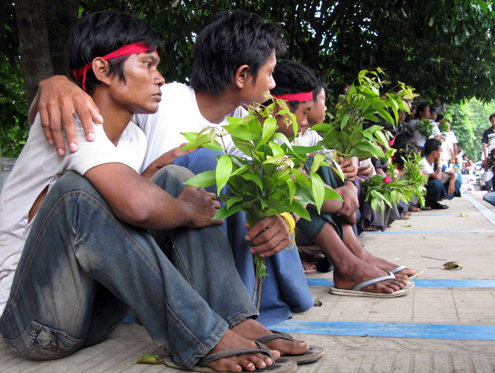Twelve factory employees, who are being held in remand after brawling with their supervisors, claim they are being treated unfairly and forced to work in Rangoon’s notorious Insein Prison.
The employees were arrested on 14 May after fighting with their supervisors at a factory owned by the Tawwin Family Company last December.
Family members who visited the detained workers last week said they were being assigned manual labour jobs, including disposing of human waste, even though they have yet to be convicted of any crimes.
“They said their living conditions aren’t too good in the prison – they were being assigned with prison labour jobs such as gardening and human waste disposal,” said Than Naing, the father of one of the incarcerated labourers.
Employees at the Tawwin Company’s factory at Wartayar Industrial Zone in Rangoon had organised a number of strikes since October due to the dismal working conditions in the facility.
Labour organisers pushed for an end to the practice of sending employees outside of the company’s facilities to work and demanded that new rules and regulations not be passed without the consent of the factory’s workers. The workers also called for the drafting of contracts and the issuance of social security membership cards.
An employment tribunal later ruled in favour of the workers’ demands; however, the decision had not been enforced when the company filed for an appeal with the Supreme Court. Employees later agreed to continue working while their case was being mediated by the country’s Labour Department.
In December last year, the labour organisers at the factory brawled with their supervisors, resulting in the filing of lawsuits from both parities. The employees who allegedly participated in the violence were arrested on 14 May and charged with trespassing.
“It is a common thing in labour disputes – lawsuits and counter-lawsuits are filed between employers and the workers, but in most of the cases, it is the workers who get prosecuted in the end. It seemed in this case that the [authorities] are siding with the employers,” said 88 Generation Peace and Open Society’s Labour Affairs Coordinator Aung Thu.
“There are laws in Burma but they are being, not only double-crossed, but are triple and quadruple-crossed.”
Conditions inside Burma’s 43 detention centre facilities are notoriously poor, where the abuse and torture of inmates by authorities is commonplace and diseases are widespread.
In January, the International Committee of the Red Cross resumed visits to Burma’s prison facilities; however, their findings are reported privately to the government and will not be made available to the public.
Earlier in January, Phyo Wai Aung, who was falsely accused of masterminding a bombing during the Rangoon Thingyan festival in April 2010 and was tortured and beaten while incarcerated, died less than six months after being pardoned.
Following the UN Special Rapporteur on human rights in Burma Tomas Quintana’s trip to the country in February, the envoy condemned the government’s ongoing incarceration of political prisoners, along with allegations of widespread torture and abuse in the country’s detention facilities.



